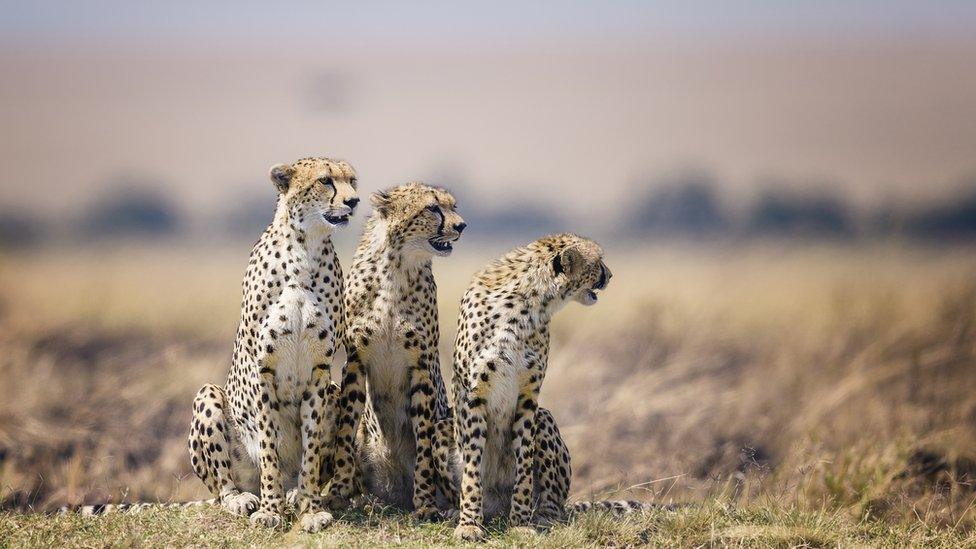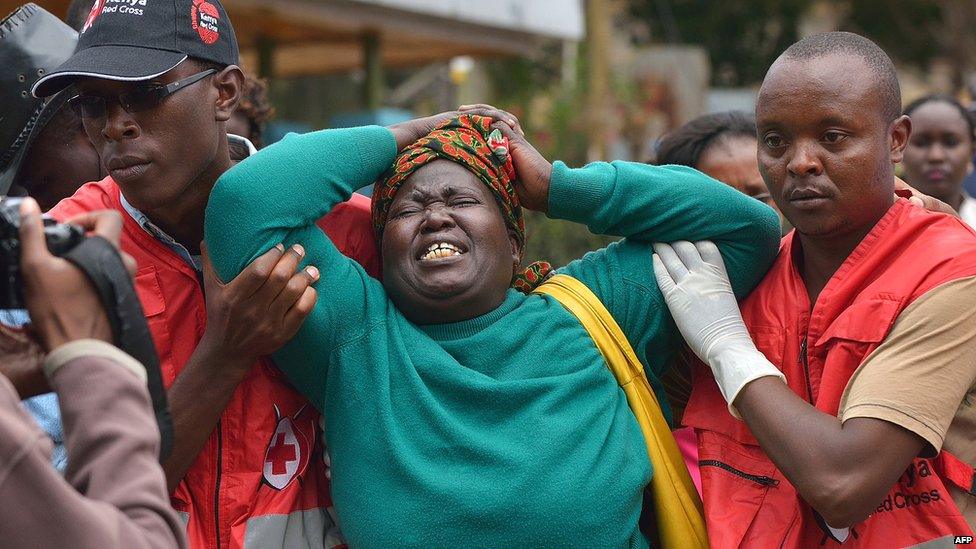Kenya profile - Timeline
- Published

Cheetahs in Kenya's Maasai Mara game reserve
A chronology of key events:
c 3.3 million BC - Evidence of some of the earliest human tools have been found in Kenya, suggesting that it was the cradle of humanity from which descendants moved out to populate the world.
600 - Arabs begin settling coastal areas, over the centuries developing trading stations which facilitated contact with the Arab world, Persia and India.
1895 - Formation of British East African Protectorate.
1920 - East African Protectorate becomes crown colony of Kenya - administered by a British governor.
Mau Mau
1944 - Kenyan African Union (KAU) formed to campaign for African independence. First African appointment to legislative council.
1947 - Jomo Kenyatta becomes KAU leader.
1952-53 - Secret Kikuyu guerrilla group known as Mau Mau begins violent campaign against white settlers. State of emergency declared, Jomo Kenyatta jailed, KAU banned.
1956 - Mau Mau rebellion put down.
1960 - State of emergency ends. Britain announces plans to prepare Kenya for majority African rule. Kenya African national Union (Kanu) formed by Tom Mboya and Oginga Odinga.
Independence
1961 - Jomo Kenyatta freed from two years of house arrest, assumes presidency of Kanu.
1963 - Kenya gains independence, with Mr Kenyatta as prime minister.
1964 - Republic of Kenya formed. Jomo Kenyatta becomes president and Oginga Odinga vice-president.
1966 - Mr Odinga leaves Kanu after ideological split, forms Kenya People's Union (KPU).
1969 - Assassination of government minister Tom Mboya sparks ethnic unrest. KPU banned and Mr Odinga arrested. Kanu only party to contest elections.
1974 - Kenyatta re-elected.
Moi era
1978 - Kenyatta dies in office, succeeded by Vice-President Daniel arap Moi.
1982 June - Kenya officially declared a one-party state by National Assembly.
1987 - Opposition groups suppressed. International criticism of political arrests and human rights abuses.
1991 August - Forum for the Restoration of Democracy (Ford) formed by six opposition leaders, including Oginga Odinga. Party outlawed and members arrested. Creditors suspend aid to Kenya amid fierce international condemnation.
1991 December - Special conference of Kanu agrees to introduce a multi-party political system.
1992 - Approximately 2,000 people killed in tribal conflict in the west of the country.
Multi-party elections
1992 December - President Moi re-elected in multi-party elections. Kanu wins strong majority.
1994 - Oginga Odinga dies. Opposition groups form coalition - the United National Democratic Alliance - but it is plagued by disagreements.
1997 December - President Moi wins further term in widely-criticised elections. His main opponents are former vice-president Mwai Kibaki and Raila Odinga, son of Oginga Odinga.
Embassy bomb
1998 August - Al-Qaeda operatives bomb the US embassy in Nairobi, killing 224 people and injuring thousands.
2002 July - Some 200 Maasai and Samburu tribespeople accept more than $7m in compensation from the British Ministry of Defence. The tribespeople had been bereaved or maimed by British Army explosives left on their land over the last 50 years.
2002 November - Al-Qaeda attack on Israeli-owned hotel near Mombasa kills 10 Kenyans and injures three Israelis. A simultaneous rocket attack on an Israeli airliner fails.
Kibaki victory
2002 December - Elections. Mwai Kibaki wins a landslide victory, ending Daniel arap Moi's 24-year rule and Kanu's four decades in power.
2004 October - Kenyan ecologist Wangari Maathai wins the Nobel Peace Prize.
2005 November-December - Voters reject a proposed new constitution in what is seen as a protest against President Kibaki.
2007 December - Disputed presidential elections lead to violence in which more than 1,500 die.
The government and opposition come to a power-sharing agreement in February and a cabinet is agreed in April.
Constitution approved
2010 July - Kenya joins its neighbours in forming a new East African Common Market, intended to integrate the region's economy.
2010 August - New constitution designed to limit the powers of the president and devolve power to the regions approved in referendum.
2011 August-September - Somali al-Shabab jihadists raid Kenyan coastal resorts and a refugee camp, targeting foreigners.
Troops in Somalia
2011 October - Kenyan troops enter Somalia to attack rebels they accuse of being behind several kidnappings of foreigners on Kenyan soil. Kenya suffers several reprisal attacks.
2012 January - International Criminal Court rules that several prominent Kenyans must stand trial over the 2007 post-election violence.
2012 March - Oil discovered. President Kibaki hails it as a ''major breakthrough''.
2012 May - More than 30 people are injured in an attack on a Nairobi shopping centre by al-Shabab.
2012 August-September - More than 100 people are killed in communal clashes over land and resources Coast Province.
Five people die in riots by Muslim protesters in Mombasa after the shooting of preacher Aboud Rogo Mohammed, accused by the UN of recruiting and funding al-Shabab Islamist fighters in Somalia.
Kenyatta wins election
2013 March - Uhuru Kenyatta, the son of Kenya's first president, wins presidential election with just over 50% of the vote. A challenge to the results by his main rival, Prime Minister Raila Odinga, is rejected by the Supreme Court.
2013 June - The British government says it sincerely regrets the torture of thousands of Kenyans during the suppression of the Mau Mau insurgency in the 1950s and promises £20m in compensation.
2013 September - Deputy President William Ruto pleads not guilty at the International Criminal Court to crimes against humanity charges over the 2007 post-election violence.
Al-Shabab steps up attacks
2013 September - Somali al-Shabab militants seize the Westgate shopping mall in Nairobi and kill more than 60 people, saying they want Kenya's military to pull out of Somalia.

The massacre of 148 students at Garissa college in 2015 horrified Kenya and prompted criticism of the security forces
2014 June - At 48 people die after al-Shabab militants attack hotels and a police station in Mpeketoni, near the island resort of Lamu.
2014 December - Prosecutors at the International Criminal Court drop charges against President Kenyatta over the 2007 post-election violence, citing insufficient evidence.
2015 April - Al-Shabab carry out a massacre at Garissa University College in northwest Kenya, killing 148 people.
2017 February - Government declares a drought affecting a large part of the country to be a national disaster.
2017 May - A new multi-billion-dollar railway line linking Mombasa to the capital Nairobi is opened - the country's biggest infrastructure project since independence.
2017 August-October - President Kenyatta is declared winner of the presidential election in August as well as the re-run in October.
2020 January - Al-Shabab Somali jihadists attack Camp Simba army base near Lamu, killing three Americans.
2022 August - Deputy President William Ruto narrowly wins the presidential election, beating his main rival Raila Odinga.